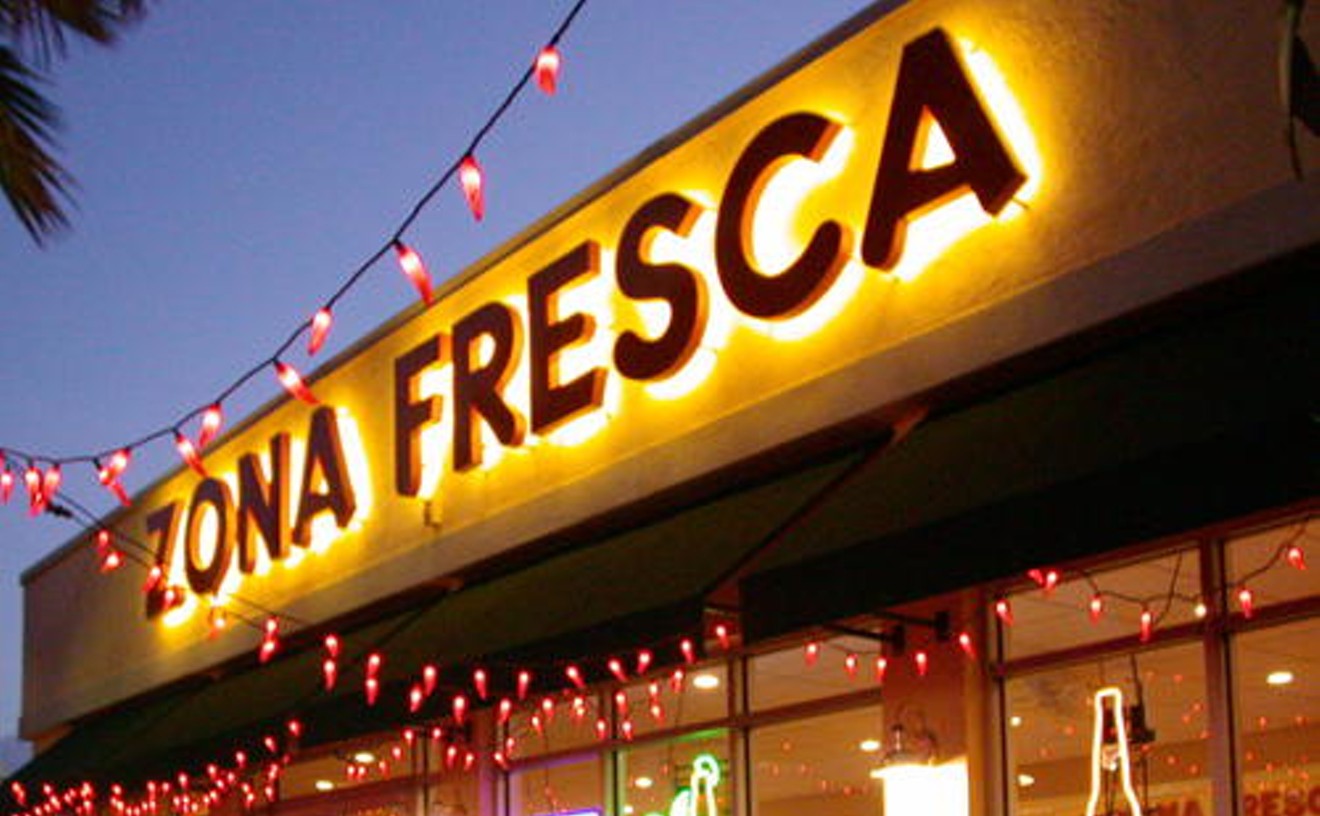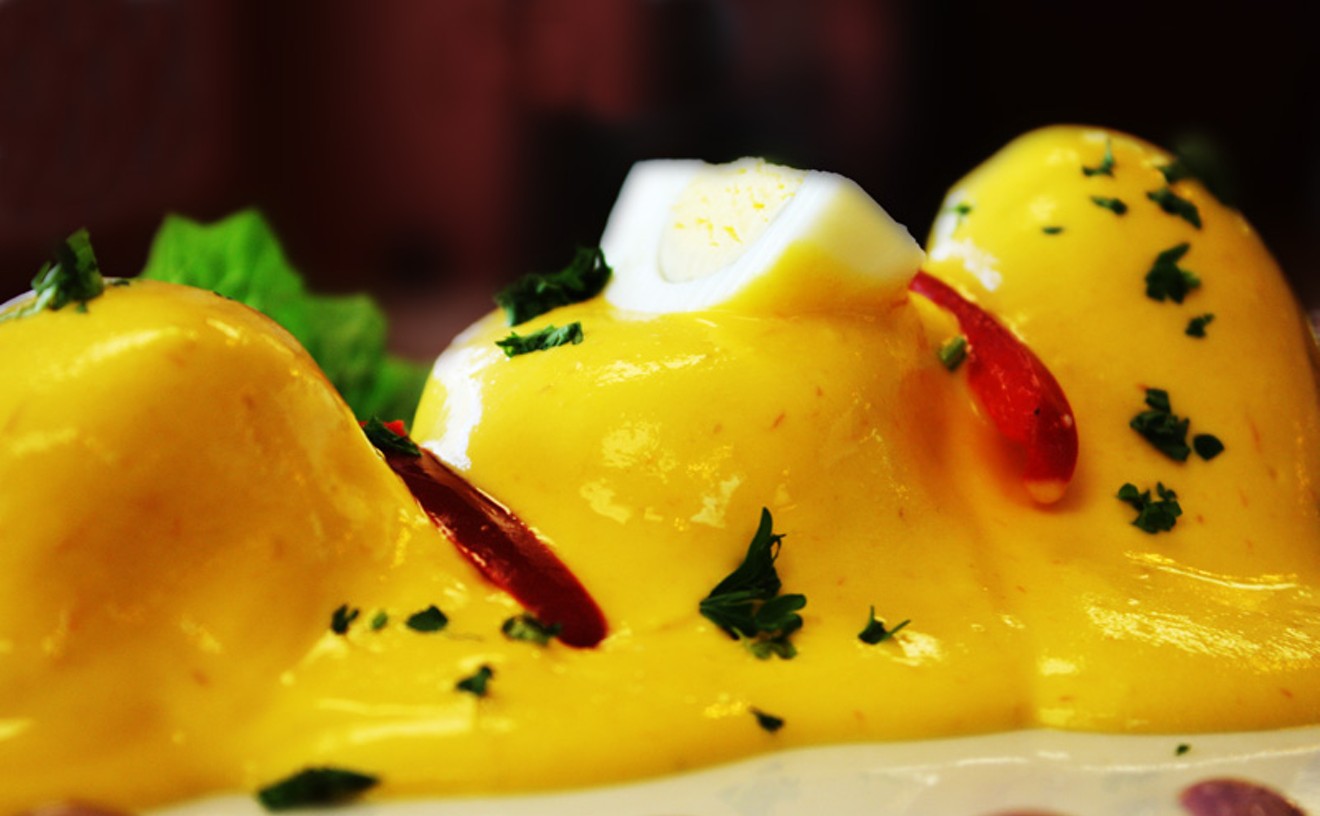Oy! Murray! Take a look at those stoy-gen! Congrat-u-lations, Murray, you and your lovely wife have found smoked fish paradise, and, believe it or not, you aren't in New York anymore. Sure, it looks a little like a Manhattan deli, what with the Hebrew National salamis hanging and the signs announcing a sale on chicken cutlets, but this place is truly a Florida-style testament to the fish that sacrificed themselves. Granted, all the swimmers had to travel a distance to get here -- the whitefish and chub are from Lake Michigan, the salmon is from Norway, and others arrived from Chile -- but the flavors are so rich that you'd think they had jumped out of the tank and into the smokers mere moments before they were served. If you've never tried smoked fish, take a taste of nova (nonsalty salmon) or sable for starters. If you are a connoisseur of the stuff, be adventurous and go for the smoked butterfish. Bet you can't find that in your local deli.
Best Fresh Seafood
Mr. Fish Seafood

You will like fish in the rain,
You will like it from a box,
You will eat it with a fox
(if you're lucky enough to be dining with one).
Owner Mike Montella, who started out as a charter-boat captain and is now nearly three decades into running this gourmet seafood market, knows a thing or two about our scaly and shell-covered friends. His fish is delivered fresh from Florida's West Coast, and he even has a local lobster diver who has been going down for about seven years to catch those local, clawless langostas. This squeaky-clean, stacked-to-the-gills place has just about every type of local fish you can imagine (pompano, snapper, grouper, mahi, stone crab claws, shrimp, lobster); it also carries cooked meals, spreads, sauces, soups, and even desserts. Rich butters are also available for dipping, flavored with everything from champagne to wasabi, and the prices are competitive. But here's the best part: You can have everything shipped overnight via the "Fish-in-a-Flash" program. Hah! Flying fish! That's something Dr. Seuss would appreciate.
- 2781 E. Atlantic Blvd., Pompano Beach, 33062 Map
- 954-941-3275
- www.mrfishseafood.com
Best Restaurant to Die and Be Reborn
KM at the Grapevine
If you believe in reincarnation, you probably think you'll come back in the next life as a sky princess or a space wizard. But odds are just as good you'll eke out your latter days as a skink. Dramatic transformations are the stuff of the afterlife. Hell, even restaurants undergo major shape-shifting in their reincarnations. Thus did the Armadillo Café, a gargantuan and popular Southwestern food palace, bite the dust in the summer of 2004 and reappear six months later as KM at the Grapevine. The new place is a tiny neighborhood fooderie wedged into a gourmet shop, open on Wednesday through Saturday nights only and offering a drastically pared-down menu. But there's no net loss of flavor, imagination, and personality in these scaled-back digs. Among our favorites were a $27 lobster quesadilla and a special: the "wild" Tasmanian salmon, which went for $26 and was simply poached in white wine and butter, nestled in a bed of sautéed spinach, and served with slim, crunchy green beans and broccolini. Kevin McCarthy, one of the partners from the old Armadillo, now has breathing space to come out of the kitchen and gab with customers, to change the menu weekly, and to experiment with exotic fish from around the globe. Favorite 'dillo standbys join new creations, the atmosphere is cozy and congenial, and the plain-Jane looks of the place can't conceal a heart of purest gastronomic gold.
Best Fish Sandwich
Fish Taco at Zona Fresca

Somehow, the folks who own Zona Fresca, a clean, bright little taqueria serving Cal-Mex style burritos, chiles relleños, and quesadillas, have managed to achieve a feat that has stumped many a local superchef: How to turn out a delicious piece of fish, consistently, honestly, and cheaply. For their fish taco, a fresh white filet is dipped in beer batter, deep fried in canola oil, then wrapped in a double corn tortilla stuffed with marinated cabbage and sour cream dressing. You pay $2.50 for this perfect minimeal, carry it over to Zona Fresca's salsa bar, which offers an array of mild to fiery sauces (we're partial to the tart, green tomatillo), squeeze on a bit of lime, eat your taco in a half-dozen bites, then head back to the counter for round two. You can spend the good part of a day engaged in this ritual, several times a week, for months or even years before you'll think of looking elsewhere for your fish sandwich. Crunchy on the outside, moist, light, and steaming inside, the fish is perfectly foiled by the bright salsa and crunchy cabbage. Zona Fresca looks like a fast-food joint with its walk-up counter and plastic utensils. It also acts like a fast-food joint -- you can get in and out in a quarter of an hour if you have to. But the strong flavors and freshness of their vegetables, lean meats, and beans cooked without lard are healthy enough to make lunch a guilt-free zone.
- 1635 N. Federal Highway, Wilton Manors, 33305 Map
- 954-566-1777
- www.zonafresca.com
Best Restaurant for the Hearing-Impaired
Kitchenetta
Brush up on your American Sign Language before heading to this stylish Fort Lauderdale eatery... because the torturous clamor prevents any meaningful conversation. What with the metal chairs and concrete floors, the tables on rollers, and the exposed ceilings, you can hear every barked order, every dropped spoon, resonate. Still, you're in sublime South Florida, darling, and you'll know it from the gnocchi with gorgonzola cream sauce ($14), the flat-screen TV, and the hot -- if sometimes unpunctilious -- waiters. Who needs talk, anyway, when you can just make goo-goo eyes and blow kisses across the table? Sometimes what's left unsaid is what really counts in matters of the heart... and, perhaps, of the stomach.
- 2850 N. Federal Highway, Fort Lauderdale, 33306-1426 Map
- 954-567-3333
- www.kitchenetta.com/
Best Bagels
Sage Bagel & Appetizer Shop

When a restaurant makes it to 32 years old, it has to be something more than a stroke of luck and a good location. It's the food, damn it -- or, in this case, the bagels. Indeed, after three decades, Sage Bagel & Appetizer Shop is still reeling in the same loyal bagel lovers week after week. The menu covers all the standard bagel types (plain, poppy, pumpernickel), specials (jalapeño, bran), and the extra-special (bialy). The cost for a single bagel is 75 cents; make that $1.95 with regular cream cheese, $2.35 for chive or vegetable, and $5.99 for lox. If you dine in, be sure you're ready to eat, 'cause the food comes fast. The menu includes far more than bagels. There's all manner of breakfast bites, full dinners, and desserts. If you plan to do some shopping for the week, a dozen bagels costs eight bucks, and a quarter-pound of cream cheese goes for $1.59. Make sure that alarm clock's set for bright and early; Sage opens at 6:30 a.m. every day.
- 800 E. Hallandale Beach Blvd., Hallandale Beach, 33009 Map
- 954-456-7499
- www.sagebagelanddeli.com
Best Chinese Restaurant
Silver Pond

The best way to find great Chinese food -- unless you happen to live in San Francisco, where it rains jasmine tea -- is to disguise yourself, Inspector Clouseau-style, and trail a Chinese family at a safe distance. A little careful sleuthing and you'll end up at Silver Pond in Lauderdale Lakes. Getting a table might be another matter, since Hong Kong families, and New York families, and Vancouver families will have gotten there well ahead of you. But the few minutes you'll have to cool your heels will allow time to inhale the scents wafting from passing trays, to pick the exact lobster/crab/flounder you want from the wall of fish tanks, and to peruse the 200 dishes on the menu. Some of these inevitably may be new to you (braised sea cucumber); some may be old friends (pork fried rice). But it's the in-betweens that will take your breath away: a whole sea bass steamed in ginger and filleted tableside (market price); a whole barbecued Peking duck for two ($35) served in two courses: the honey-sweet, oleaginous skin wrapped in a pancake with hoisin sauce first and the cut-up duck with vegetables to follow. A bamboo basket of scallops with homemade bean curd ($11.50) is as delicate and creamy as the inside of a courtesan's thigh; salted, chopped, and flash-fried crabs ($9.50) are as rich and steamy as that same courtesan's pillow book. And if you've been feeling a little slow on the uptake, shark's fin soup ($10) is an ancient -- and delicious -- remedy for what ails you.
- 4285 N. SR-7, Lauderdale Lakes, 33319-4844 Map
- 954-486-8885
- m.facebook.com/profile.php?id=121390107875971
Best Ceviche
Las Totoritas

- 7665 Pines Blvd., Pembroke Pines, 33024 Map
- 954-894-1828
- www.totoritas.com/
Best Restaurant for Intimate Conversation
French Quarter
"Language of Love Spoken" reads the sign in the window. Not really, but where better for a sotto voce discussion of the nice and naughty things you'd like to do with that plate of shrimp maison au beurre blanc ($14.25 lunch, $25.95 dinner) than at the French Quarter? In this centrally located spot, Paris, the city of amour, meets the Big Easy, city of sin. Nestled at a table under glass skylights, partially hidden by tropical plant fronds that are becomingly lit by gas lamps, you'll almost certainly get something going here. But if you fail -- or things are looking grim -- impress your dinner companion with your savoir faire. Just casually mention that the duck à l'orange ($22.95) was Grace Kelly's favorite dish and that the baked Alaska ($12 for two) was invented by master cooks of the Chinese Celestial Empire. It won't hurt your case to choose a bottle from one of the best wine lists in the city either. Here's a hint, you big lug: There's no romantic problem that a double magnum of bubbly won't solve.
Best Asian Market
Hong Kong Market

Owner Benjamin Wong is big into numbers. If you ask him how long his market has been around, he'll tell you 15 years. Ask how many Chinese videos he has available for rental and he'll quickly inform you, "More than 100,000." (That's including the ever-popular Kung Fu Hustle.) If you inquire about a special type of teapot, he'll invite you to choose from more than 100,000 of them. OK, so perhaps they are not all to be found in his market, but he really seems eager to help customers find whatever Asian product they have a yen for. Never tried a sweet yet salty dehydrated plum (they start at $1.25 for a small bag) or dry shredded pork ($1.65 for a four-ounce container)? Just request Wong's opinion on the product and he'll likely split a bag with you. Wondering what kind of pudding is actually stored inside the oversized plastic kitty heads? He may bust one open to show you. Of course, he can't really share some of the teas he carries -- especially since they are used to treat maladies like gall bladder and liver dysfunction -- but you would probably feel comfortable talking about PMS or erectile dysfunction with Wong, and he'd provide just the tea for the job. And since teas start at only $2.95 a box, you'll find them much cheaper than a box of Midol or a blister pack of Viagra. If you have never set foot in an Asian market, stroll into Hong Kong some evening (the market is open until 8 most nights). You'll get an instant education and possibly even some samples.
- 5371 Florida 7, Lauderhill, 33319 Map
- 954-485-6688





